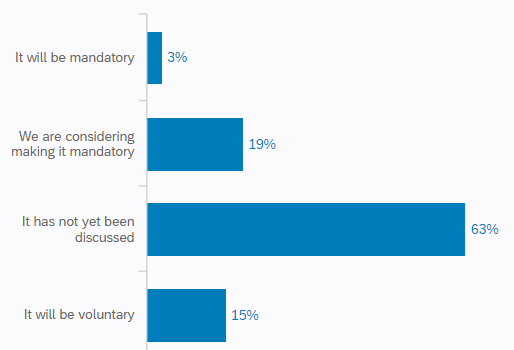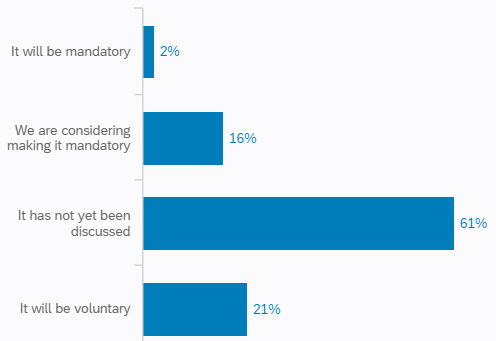Happy new year! I hope this year is off to a good start for you. It is off to a rip-roaring start for AACRAO Research but rather quiet on the research front elsewhere.
AACRAO Research Update
The January 60-Second Survey asked about summer/fall course plans and any plans associated with the COVID-19 vaccine. The full report is available on the AACRAO website. Of the survey respondents, 42% are asking faculty to be prepare for teaching fully
online for summer 2021, and 13% are doing so for fall 2021.
Most have not yet discussed plans for the COVID-19 vaccine for students, faculty and staff (see below). The questions asked were “When at least one COVD-19 vaccine is widely available, will it be mandatory for students (employees for second question)
who will be on campus for any purpose?”
Plans for the COVID-19 Vaccine for Students

Plans for COVID-19 Vaccine for Employees

We have several active and potential projects. The active projects are sponsored research on two topics: the current use and future of digital credentials in higher education and training needs for front-line staff, management and senior leadership. The
free webinar for the digital credentials project will take place on February 17th at 1 p.m. EST.
Some key takeaways from the digital credential research include:
• 32% of institutions intend on devoting more resources to the digitization of credentials in direct response to the COVID-19 pandemic.
• More than half are concerned about credential fraud.
• 89% issue one or more digital credentials today.
• Digitally-signed PDFs are the predominant platform for digital credentials.
• Few are familiar with how blockchain can be used in higher education.
The training needs report will be released before the related webinar in late April.
Potential projects include additional research on stranded credits and student debt as well as the impact of transfer policy and practice on credits applied to a degree. Both projects are expansions of research we completed in 2020.
Current Higher Education Research and Related Topics
First Look Report: Baccalaureate and Beyond
The National Center for Educational Statistics (NCES)
released a new 2018 outcomes report on those who received a bachelor’s degree in 2007-08. Among the findings are the following:
• Less than half completed an additional degree.
• 85% were employed full-time, but there were differences by gender, with 81% of females working full-time compared to 91% of males.
• Median earnings differed greatly between those in engineering fields ($93,000) compared to those in business support and administrative assistance fields ($46,000).
• Those who graduated from a public institution were making an average of $393 in educational loan payments in 2018.